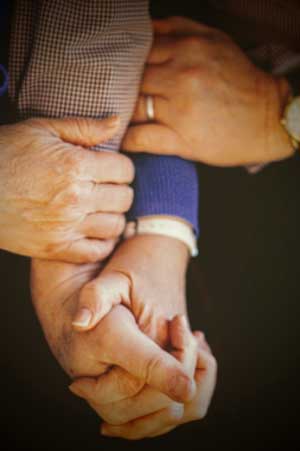Alzheimer's & Dementia: Early Warning Signs to Look Out For
As your loved one ages, it’s common to notice some changes in their attitude and behavior. Some changes are completely normal, while others may be indicative of a brain injury or disease. As such, it’s important to familiarize yourself with early warning signs to look out for that may point to Alzheimer’s and dementia in your loved one.
What are Alzheimer’s and dementia?
Dementia refers to the general decline in brain function that happens with old age. Alzheimer’s is a specific disease that causes dementia. Dementia is very common, affecting more than 3 million cases each year in the United States. Dementia typically leads to reduced short-term memory, trouble communicating, and difficulty with problem-solving. Unfortunately, there is no cure for dementia at this time.
What are early warning signs of Alzheimer’s and dementia?
 Many dementia symptoms are commonly thought of as side effects of being old, which can make it difficult to identify which behaviors are concerning ones in your loved ones. To help you understand, we’ve broken down the symptoms along with examples of both normal and concerning behaviors.
Many dementia symptoms are commonly thought of as side effects of being old, which can make it difficult to identify which behaviors are concerning ones in your loved ones. To help you understand, we’ve broken down the symptoms along with examples of both normal and concerning behaviors.
Frequent Memory Loss
As we get older, it’s common to occasionally misplace things like our glasses or car keys. Meanwhile, frequently forgetting recently learned information and repeating the same questions are both early warning signs of dementia. Forgetting what day it is for a few moments isn’t a concern, but not knowing what season or year it is signifies a need to see a doctor.
Inability to Plan or Problem Solve
Forgetting the occasional appointment is totally normal. Constantly missing important dates, forgetting appointments, and not paying bills on time are all warning signs of dementia.
Difficulty Completing Daily Activities
Needing help working the remote or sending an email is totally normal for seniors. Requiring help with newer technology is very common and isn’t typically a concern. However, not being able to follow their favorite recipe, take daily medications, get dressed, or tidy up around the house can all be signs of concern.
Struggling to Communicate Thoughts
We all forget a word or two occasionally. Your loved one may mix up phrases or struggle to come up with the right word occasionally. It’s cause for concern when your loved one cannot communicate their thoughts and struggles to hold a conversation with a loved one or friend.
Apathy or Drastic Mood Changes
As people age, it isn’t uncommon to withdraw and become less friendly with strangers or confrontational with family members occasionally. While your loved one’s personality may evolve over time, it’s important to look out for drastic mood changes or apathy, which are signs that your loved one may have dementia.
Are there any ways to prevent or reduce the risk of Alzheimer’s and dementia?
There are multiple conditions that have been shown to increase the likelihood of developing Alzheimer’s and dementia. Several reports have revealed that high blood pressure, high cholesterol, and diabetes may increase the risk of developing dementia. These findings indicate that incorporating a well-balanced diet of fruits, vegetables, and whole grains may be effective. If your senior is willing to try a new diet, there have been studies encouraging the inclusion of a Mediterranean diet. However, it’s worth noting that there isn’t one perfect diet.
Aside from maintaining a healthy diet, it’s also important to stay active — both physically and mentally. Taking brisk walks with your loved one around the neighborhood and playing mental puzzles like sudoku or crosswords can help provide the physical and mental stimulation that your senior needs.
What should I do if my loved one shows early warning signs of dementia?
 It can be scary to start noticing changes in your loved one. As scary as it is for you, it’s often more challenging for your loved one. If you do start to see any of the above warning signs, shy away from self-diagnosing. It’s best to recommend your loved one see a doctor and chat through their symptoms.
It can be scary to start noticing changes in your loved one. As scary as it is for you, it’s often more challenging for your loved one. If you do start to see any of the above warning signs, shy away from self-diagnosing. It’s best to recommend your loved one see a doctor and chat through their symptoms. Be supportive when talking to your loved one, and try to avoid telling them what to do or how to behave. Instead, be sure to listen to their concerns and hear them out. Those experiencing later stages of dementia respond much better to visual cues than verbal dialogue, or supportive comments. Be sure to display body language that shows you’re listening and engaged in the conversation.
Offering to go with your loved one to their appointments can be helpful. Especially if your loved one suffers from short-term memory loss, it will be helpful to have someone to come with and take notes.
It’s also worth noting not to become hostile towards your elderly loved ones if they are experiencing symptoms of dementia. More often than not, it’s unlikely that they are fully-aware of the changes in mood and memory. While it may be frustrating at times, it’s crucial to always approach conversations with empathy at the core.
Finally, remember to look after yourself. These can be challenging changes to start seeing in your loved ones. Be sure to take time for yourself and ask for help when you need it.
Right at Home — Milwaukee provides in-home senior care services so your loved ones can get the care they need from trusted professionals, without leaving the comfort of their home. We regularly share educational resources on elderly care and senior living. Subscribe to our newsletter to stay informed about all the latest Right at Home - Milwaukee news.




